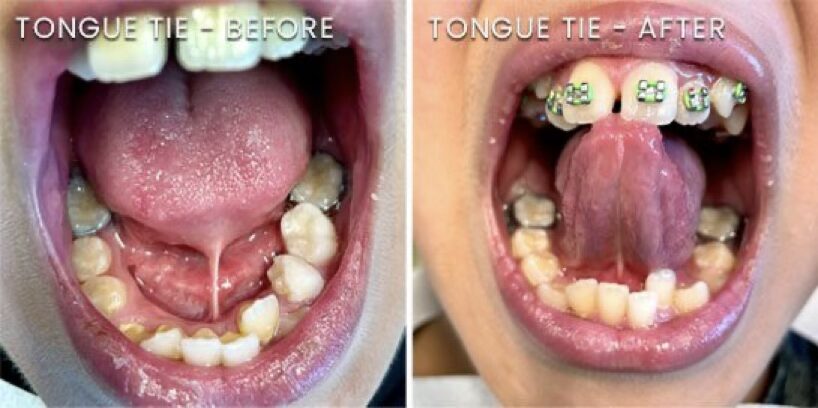
Benyammi Family Dentistry. Mountain View, CA
Tongue Ties
What Parents Should Know
Parenting comes with plenty of questions, especially when it comes to your child’s growth and development. Oral health is no exception. Navigating these questions can be tricky without a guidebook to follow. When it comes to your child’s oral health, the best advice will come from a trusted dental professional — and sometimes, concerns like a possible lip or tongue tie can leave you wondering: Will this resolve on its own? Should I take action now? If you’re curious about what lip and tongue ties are, how they affect children, and the available treatment options, here’s what you need to know.
What Are Lip and Tongue Ties?
- A lip tie occurs when the tissue beneath the upper lip (labial frenulum) is unusually short or thick, limiting lip movement.
- A tongue tie happens when the frenulum beneath the tongue (lingual frenulum) is too tight, restricting tongue movement.
Both conditions can interfere with essential functions like breastfeeding, speech development, and oral hygiene.
The “Wait-and-See” Approach
It’s understandable for new parents to hope the condition will improve naturally as their child grows. While some mild cases may loosen over time, relying on a wait-and-see approach can create unnecessary stress to parent and child.
In more severe cases — especially when breastfeeding or speech development is affected — will likely require professional intervention. Relying on a “wait-and-see” approach could potentially cause your child more harm and delay important treatment.
Risks of Leaving It Untreated
Without treatment, lip and tongue ties may lead to:
- Breastfeeding difficulties → Babies with lip or tongue ties may struggle with latching, which can lead to frustration, pain for the mother, and poor feeding habits for the baby.
- Speech development concerns → As the child grows, limited tongue or lip movement can interfere with speech development, causing difficulties with articulation and certain sounds.
- Dental/oral health issues → An untreated lip or tongue tie can contribute to misalignment of the teeth or complications with maintaining good oral hygiene.
Additionally, the excess strain caused by restricted movement may lead to dental problems down the road.
Treatment: The Frenectomy
The most effective solution is a frenectomy — a quick, minimally invasive procedure where the dentist gently releases the restrictive frenulum.
- The procedure is generally painless, as the frenulum contains very few nerves or blood vessels.
- Children typically experience fast healing and an immediate improvement in lip or tongue mobility.
- At Benyammi Family Dentistry, our team uses advanced tools and techniques to make the process safe, smooth, and stress-free for both child and parent.
Why Early Intervention Matters
Addressing lip and tongue ties early helps prevent future feeding, speech, and dental issues. While advice online can be helpful, it should never replace professional evaluation.
If you suspect that your child is dealing with a lip or tongue tie, don’t wait. Contact Benyammi Family Dentistry in Mountain View, CA today to schedule a consultation and discuss the best course of action.
Contact: Benyammi Family Dentistry:
Phone: (650) 254-1596
Location: 777 Cuesta Drive, Suite 140, Mountain View, CA 94040
Getting the right care early on can make all the difference in your child’s oral health, speech, and overall well-being. We’re here to support you and your child every step of the way!




